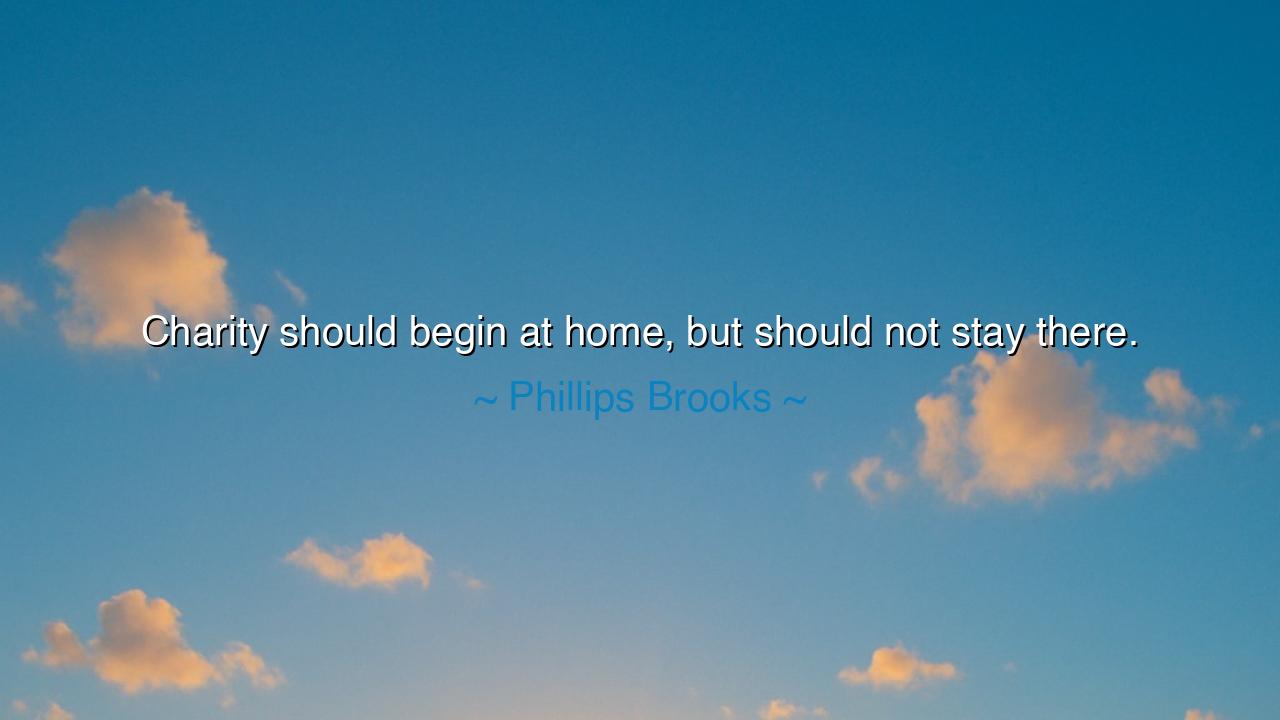
Charity should begin at home, but should not stay there.






"Charity should begin at home, but should not stay there." — thus spoke Phillips Brooks, a preacher of grace and eloquence whose words still echo with the warmth of moral light. In this saying, he captured a truth that bridges the personal and the universal — that love, to be pure, must begin in the nearest heart but not end there. For charity that blesses only one’s own household is comfort, not virtue; kindness that never leaves the threshold of the self is sympathy, not salvation.
The meaning of this quote lies in the balance between self-care and selflessness. When Brooks says charity must “begin at home,” he reminds us that goodness must first take root in the soil of our daily lives — in the way we treat our families, our friends, and those closest to us. One cannot heal the world while neglecting one’s own circle; one cannot preach compassion while sowing discord in one’s home. Yet, he warns, this beginning must not become the boundary. True charity is like a lamp — it must first light the room where it stands, but its flame is meant to spread outward, illuminating every shadow it can reach.
Phillips Brooks spoke in the nineteenth century, a time when society wrestled with questions of moral duty amid rapid industrial change. He was a man of the pulpit, the author of O Little Town of Bethlehem, and a champion of the spirit over the letter of faith. His teaching rose from the Christian tradition but reached beyond it, calling all humanity to live as vessels of compassion. His words about charity were not directed merely to the wealthy or the religious, but to every heart capable of love. He saw that true moral strength is tested not in words or wealth, but in the courage to extend one’s kindness beyond the familiar and comfortable.
There is a timeless story that mirrors his truth — the story of Florence Nightingale, the lady with the lamp. She began her service at home, tending to the poor in her own city, defying social convention to care for those whom others ignored. Yet her charity did not stop there. It spread like fire across the world, guiding her to the battlefields of Crimea, where she nursed the dying and redefined compassion itself. Her heart was her home, but her love knew no borders. Like Brooks, she understood that the measure of goodness is not in where it starts, but in how far it travels.
The lesson is clear: compassion must grow. Love that never leaves the circle of one’s own comfort is like a spring that feeds no river. Begin with kindness toward your family, your neighbors, your friends — but let that kindness be practice, not conclusion. Let your charity cross the boundaries of tribe, faith, and nation. If your home is bright with love, open its doors; let others find warmth there. The world does not suffer from a lack of wealth, but from a lack of hearts willing to share it.
Brooks’s teaching also carries a warning for our modern age. We live in a time of digital isolation, where compassion often stops at a screen. Many speak of justice, yet ignore the lonely elder next door. Many donate to causes abroad, yet neglect peace in their own homes. Brooks’s words remind us that the circle of love must be both intimate and vast. It begins with one act of gentleness — a kind word, a patient ear, a helping hand — and from that seed, it must branch outward into a living tree that shelters all.
So remember this, O seeker of goodness: charity begins in the heart, but its destiny is the world. Let your compassion first make your home a haven, your friendships strong, your family whole. But when your roots are deep, lift your gaze to the horizon and send your kindness forth. For the truest love does not hoard itself — it multiplies. And when the heart becomes both hearth and beacon, then, and only then, will the spirit of Phillips Brooks’s words be fulfilled — a world where charity begins at home, but never ends there.






AAdministratorAdministrator
Welcome, honored guests. Please leave a comment, we will respond soon